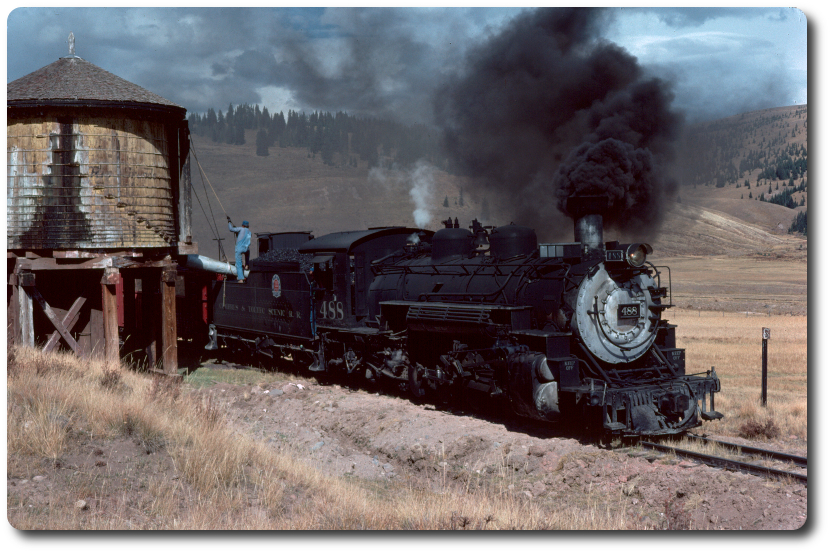This is about the Main Narrow Gauge equipment that went to a cranberry bog in Mass, operating for years as the Edeville Railroad, and was returned in a grand procession of 18 wheelers a few years ago.
Nice story, sounding familiar to anyone who wishes to preserve steam equipment.
"The easy solution would be to roll the four steam
engines out in front of the Maine Narrow Gauge
Railroad Museum, hang a plaque on each with a few
nice words about the way life used to be, and call it a day.
But to understand just how wrong that would be, you
need only ask Gerry Bagley,71, of Hollis Center, why he spends several days a week
hunched over this antiquated equipment,
doing whatever it takes to keep the wheels turning.
"I don't know . . . I can't tell you," Bagley said
Wednesday with a faraway look in his eyes. "It's like a spirit . . . I just like the sound of it."
Many of them are over 70 and counting. They receive no pay for the hundreds of hours they devote to the Maine Narrow Gauge Railroad - a sliver of
Maine's heritage if ever there was one - so it can chug up and down its 2-foot-wide, 1.5-mile-long stretch of track along Portland's waterfront.
And never has this 10-year-old operation - part tourist attraction, part living history - needed them more than now.
It all started with the state Department of Professional and Financial Regulation, which for a the past decade had placed its seal of approval on the boilers in the bellies of the railroad's four
steam engines. Last summer, state officials decided that boilers on wheels might better be monitored by the Federal Railroad Administration.
They decided right. The FRA took one look at the Maine Narrow Gauge Railroad and informed Executive Director Bill Hall that by law the railroad's steam engines should not be operating without a federal license. And in order to get that license, Hall was told, each engine must undergo an inspection that would make a proctologist wince.
"It's an expensive process," said Hall. "Basically you have to inspect the boiler inch by inch."
We're talking ultrasound here. And asbestos removal. And leak testing for each of the 142 "stay bolts" that connect the firebox to the boiler. We'd be talking $30,000 to $50,000 for each steam
locomotive if the work was done by the few companies who do such things - enough to stop the Maine Narrow Gauge Railroad in its tracks.
"The cost was absolutely staggering," Hall said.
Enter the train fanatics.
Every weekend since early January, they've flocked to the wooden A-frame that now stands like a small cathedral over steam locomotive Number 4. They had to leave the asbestos removal to the professionals, but the rest of the work - laying
out a chalk grid over the exposed boiler, conducting an ultrasound wherever two lines intersect, recording the thickness
of the steel at each spot, climbing inside to chart those hard to reach places - has become their labor of love.
They come in overalls and work gloves and railroad caps. They come from all over Maine and New Hampshire and even Massachusetts. Their backgrounds are different - heavy equipment operator, printer, stone mason, plastics manufacturer,real estate investor - but their passion is the same.
They all love trains. Old trains.
"I've lived by the railroad tracks all my life," said Dave Campbell, who at 55 is "the puppy" of the boiler boys. "I see this as a piece of Maine history - and we are the stewards of it."
To a man, they will tell you that there's something different about a steam locomotive. Yes, it's a machine just like the diesel that rendered it obsolete, but it's also - and they're not kidding
when they say this - like a beloved member of the family.
"A steam locomotive to me is the closest a machine has ever come to a living thing," said Paul Hallett, the railroad's steam operations manager. "And each one of them has a different personality."
Hallett, who logged 5,000 miles last year driving between Portland and his home in Nottingham, N.H., calls Number 4 "Steady Eddie" because "she shows up every day ready to do whatever you ask her to do." Number 7, he continued, is "The Gracious Lady." Number 8 is "The Brute." And tired old Number 3,
long the workhorse of the fleet, is simply "Your Best Friend."
Go ahead, call them men with too much time on their hands. But the next time you drive up Fore Street and see the steam billowing back over a trainload of wide-eyed children, remember that pieces of the past don't preserve themselves. People with memories do.
"If we don't do it," said Hallett, "it won't get done."
Columnist Bill Nemitz can be contacted at 791-6323 or at:
bnemitz@pressherald.com


